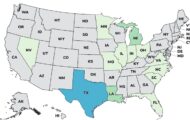An ag-gag law in Utah has been struck down. Earlier this month, the Utah attorney general said that no appeal would be filed in a federal court decision to end the law as unconstitutional.

These laws criminalize video recording on ranches and farms that expose animal abuse. Members of animal rights groups pose as workers to film cruelty against animals. University of Denver law professor Justin Marceau, one of the attorneys who represents animal rights groups said, “[Ag-gag] laws in states like Iowa and Kansas are crying out for a challenge at this point.”
The state that have some type of this law on the books include Kansas, Montana, North Dakota, Iowa, Missouri, Arkansas, North Carolina and Alabama. Animal rights advocates say that these laws violate free speech and target whistleblowers. They also undermine food safety, since animals living in crowded and filthy conditions are more likely to develop illness.
Stephen Wells, executive director of the Animal Legal Defense Fund said in a statement, “Utah’s decision not to appeal its loss is a signal to other states that these unconstitutional Ag-gag laws are indefensible. Should Utah’s legislature try to pass a new Ag-gag law to replace the last one, we’ll see them back in court.”
The Humane Society says that ag-gag laws are “a threat to public health, animal welfare, and the environment.” In 2008, an HSUS investigation found that a California slaughter plant, Hallmark/Westland meat plant, was sending sick downer cattle into the country’s food supply. If ag-gag laws had been in effect at that time, children could have been exposed to mad cow disease. In addition, insanitary living conditions for food animals can lead to disease that could be transmitted to humans.
Many ag-gag laws are “quick reporting”, which means that investigators must turn over footage immediately. That stops investigators from documenting a pattern of abuse.
Many advocates believe that undercover operations expose unsanitary conditions that could lead to food poisoning outbreaks. And, environmental violations can have an affect on food safety. Manure storage lagoons can leach into the groundwater, potentially contaminating the water supply, or can contaminate crops. Organizations that are opposed to these laws include Center for Food Safety, Farm Forward, Food & Water Watch, and Physicians Committee for Responsible Medicine.




